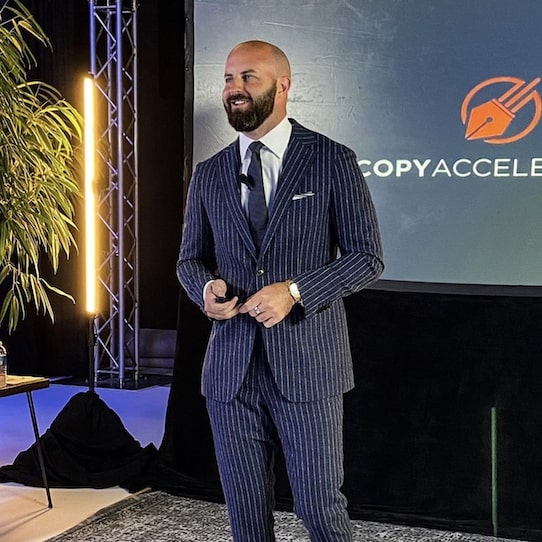
Justin Goff had fellow copywriter Ian Stanley on a live stream recently to discuss the five bad beliefs about money that are holding you back. “Really my favorite thing to talk about at this point is money blocks, your emotional relationship to money,” Ian says. “What you learned in your childhood, from your parents, your teachers, the kids, your coaches, the influential people in your life, society, TV, and how that’s still affecting you.” This is important stuff. Scroll down.
NEXT: How To Do This Yourself Starting Today
“Pretty much all of us have a five year old or a thirteen year old kid walking around with us, making most of our financial decisions,” Ian continues. “So, you know, would you trust a five year old to make your financial decisions? I would guess no but that’s really what a lot of people are doing.” Ian lists the five main money blocks. The first is that rich people are jerks. This usually comes from families who grew up with very little. They look at wealthy people and go, “Yeah, you may have more money than us, but we’re better people.”
Block two is that money is evil. But the truth is it’s neither good nor evil. It’s simply a medium of exchange. Its single purpose is to flow. Can people use it in a bad way? Of course, and some do. But that’s because, if anything, it’s an amplifier. It makes you more of who you are. As long as you’re a good person, you’ve got nothing to worry about. Go make as much money as you can and do good things with it. Give to cancer research or donate to relief efforts when a city is ravaged by a tornado or pay off your mom’s mortgage.
Block three is that there isn’t enough money. This is basically a scarcity mindset. Ian thinks most of us have this, at some level. Maybe it appears when you get to five K a month, or ten K a month, or not till a hundred K a month, but it’s probably coming for you if it hasn’t yet. “And I can say that there is enough money because the U.S. just printed forty percent of the money in circulation in the last year. So there is enough money. Even if you live in a poorer country, with crypto and decentralization, you have access to more money than ever today.”

The fourth money block is that you feel like you have to work harder and longer hours in order to make more. In America, especially, this is ingrained in us at a young age. Hard work pays off. If you’re not as successful as you’d like to be, you’re probably just being lazy, right? “I wish hard work were the answer,” Ian says. “Because it’d be really easy. To make people rich, you’d just go, ‘Well, just work harder.’ But if hard work was the answer, we’d have way more rich people. There are tons of people that work incredibly hard that have never had much money.”
Not that hard work, in and of itself, is bad. Ian’s not against hard work. But you have to apply it to the right things. It’s that whole less but better concept. Do one or two tasks that really move the needle, and then be done for the day. You don’t need to kill yourself with twelve hour shifts seven days a week. Fifth and final, you got the “I don’t deserve it” block. Again, you might not have this now, but you will as you ascend in business. So you have to proactively work to ensure you feel worthy of that next level.
Ian also rants, if you have kids, you shouldn’t pay them to do chores. Why? Because you’re teaching them that you have to do stuff you don’t like if you wanna earn money. And that’s not necessarily true. Ian believes there’s always a way to monetize your passion, to make money doing what you love. Sure, still make them do the chores, for perspective and humility and all that, but don’t tie it to money. Or else they might grow up and think they have no choice but to sit in that soul-sucking cubicle for the next thirty-five years. Awesome content by Justin and Ian, two of the top copywriters in the game.
TRENDING: Hit Publish Once, Get Paid Forever